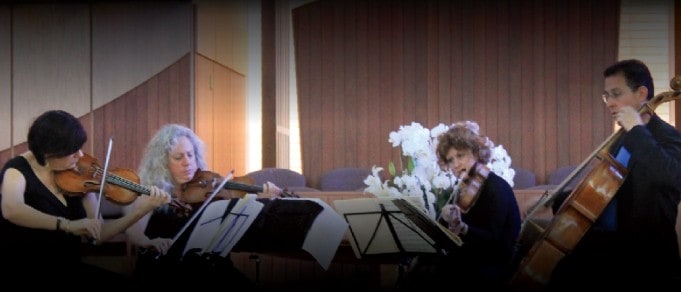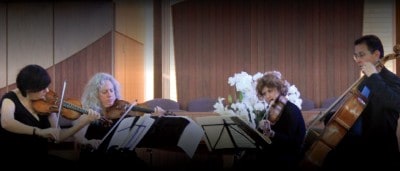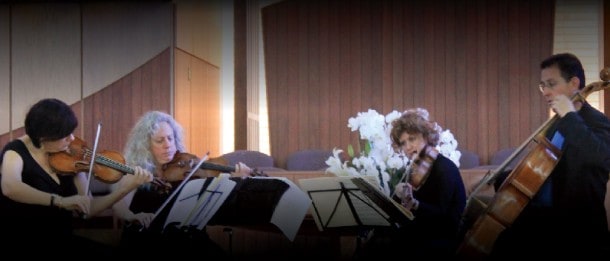Music in Context Series – Rags by Joplin and Bolcom
- Bettina Mussumeli – violin
- Susan Freier – violin
- Jodi Levitz – viola
- Stephen Harrison – cello
- Stephen Harrison – cello
Rags occupy an uneasy seat in American music, wedged as they are between classical and popular. Indeed, if it weren’t for off-the-chart sales of Joshua’s Rifkin’s 1970 two-record set of Scott Joplin rags, followed by the 1974 movie “The Sting,” most of us might be entirely oblivious. However, Rifkin and “The Sting” are far from the whole story about rags – or even about Scott Joplin. The Ives Quartet and musicologist Derrick Katz provided a far more enlightening picture at their most recent Palo Alto Salon.
I was surprised to learn that the IQ were devoting an entire event to ragtime. After all, didn’t cellist Stephen Harrison once quote Goethe’s definition of a string quartet being a “conversation between four rationale people?” I scratched my head. Where’s the conversation? Where’s the complexity? And perhaps most significantly, where’s the darn piano?
Like many good things, answers are found by looking at old WBAI shows from the early ‘70s and musical lineages.
WBAI offered occasional air time to composers William Bolcom and William Albright, and pianist Joshua Rifkin, who did shows devoted to rags. These were the glory days of Manhattan’s WBAI – whose call letters were code for incredibly intelligent, left-leaning programming appreciated by those whose tolerance for outrageousness exceeded all rational bounds.
Bolcom’s compositions were part of the focus of this salon. Composing rags at this point in time – at such a distance from the earlier Scott Joplins compositions – is important because it frames a remark of Bolcom’s that IQ cellist Stephen Harrison found quite significant. It was through this genre, Bolcom remarked, he began to “unself-consciously accept being an American composer.” Indeed, Bolcom’s remark highlights the uneasiness that must have gone with being an American in a world whose authorities, at least until the current generation, were almost exclusively European.
As for lineages, Harrison pointed out that Bolcom dedicated his rags to Emmanuel Borok. Borok was, variously, concert master of Boston Pops and Dallas Symphony – and Harrison’s teacher.
The “where’s the piano?” question is easier. Like most rags from the early 20th century, Joplin’s rags were written for piano. While piano is the point of familiarity for most folks, the music can be transcribed for many different instruments. Rags from the latter half of the 20th century, such as Bolcom’s, were often written for something else. Bolcom’s in particular, were written for strings.
As always, these salons intersperse lecture, performance, and Q&A. Today, the IQ performed Joplin’s Paragon and Pineapple Rags, and two by Bolcom: Poltergeist Rag and Gracious Ghost. Between pieces, they joined Derrick Katz in discussing rags in general, and these pieces in particular.
I confess, the relentless militancy of rags always got old quickly for me – which is the other reason I was surprised to find them on the program. Therefore, I was ill-prepared for the subtlety of violinist Bettina Mussumeli’s dynamics. That this music lent itself to this intense classical treatment shouldn’t have been surprising, given what Harrison and Katz both described as Joplin’s need to be a high art composer, rather than a popular entertainer. However, this isn’t how we tend to think about the genre.
Pineapple Rag followed. Like all other rags, the IQ explained, this was very sectional – an introduction followed by several different melodies. Harmonies are played like a march, overlaid with syncopated melodies, which is why they can sound like demented polkas,especially if you’ve heard one too many. However, the IQ emphasized the march-like harmonies, even playing them separately so folks could better appreciate the oom-pah march that drove the piece forward.
The real gems of the afternoon were the three pieces by Bolcom. Harrison’s remarks about Bolcom feeling like an unself-consciously American composer apply here because Bolcom’s confidently letting parts of the European musical toolbox (like serial sequences) go crazy within an exclusively American framework. These works immediately connect back to Joplin, but, Harrison pointed out, whether as homage or parody, we’re never quite sure.
Poltergeist has (appropriate to the season) a Halloween feel. If the work isn’t quite a conversation between four rational adults, there’s solo passages enough for everyone, including deliciously skittery bits with a spidery feel.
Graceful Ghost, which Bolcom wrote in memory of his father, has a more lyrical song-like quality, with most of the good parts going to the viola. Being familiar with this only as a violin and piano duet, I was surprised at the intense color that the quartet brought to their arrangement. The preceding performance of Joplin was a useful point of reference because Bolcom’s rags, despite being instantly recognizable as rags, had a unexpected depth and complexity.
Incincerator Rag, like the preceding two passages, shows far more innovation than the rags we all know, which tend to feel mechanical. Also like those that preceded it, this piece, with its tempo marking “bumptious,” is rich in passages that highlight the enormous talents of violist Jodi Levitz.
The Ives Quartet will be performing three Bolcom rags next month, along with works by Quincy Porter, and Antonin Dvorak. If tickets weren’t available for Sunday’s discussion, you still have a chance to catch the IQ performing them.





